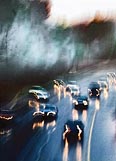
Cold, ice, and loss of power or water present special hazards to your food, health and safety. Know what to do and what to avoid before winter weather strikes.
Indoor Health and Safety
Staying Safe from Carbon Monoxide Poisoning
Any heater that burns fuel, such as your furnace, generator, gas water heater, or a portable butane or gas heater, produces carbon monoxide that can contaminate the air.
Mild exposure to carbon monoxide can cause nausea, dizziness or headaches. Severe poisoning can result in brain or heart damage, or even death.
- Do not use generators, gas or charcoal grills indoors.
- Never burn anything in a stove or fireplace that is not vented properly.
- Never heat your house with a gas oven.
- Never run a generator indoors, in an enclosed space such as a basement, or near a window.
- Do not warm your car up in a closed garage.
- If your garage is attached to your house, close the door to the house while you warm up the car.
Staying Healthy
- Food in your refrigerator will be safe to eat if power is out for less than four hours. Keep refrigerator and freezer doors closed as much as possible to keep food cold longer.
- After four hours, pack milk, other dairy products, meat, fish, eggs, gravy, and spoilable leftovers into a cooler surrounded by ice. Inexpensive Styrofoam coolers are fine for this purpose.
- Freezers can keep food safe for up to 48 hours if they are full, 24 hours if they are half-full.
- Safe water for drinking, cooking, and personal hygiene includes bottled, boiled, or treated water. Watch for specific boil water alerts in your area.
- If you are under a boil-water alert, do not use contaminated water to wash dishes, brush your teeth, wash and prepare food, wash your hands, make ice, or make baby formula. If possible, use baby formula that does not need to have water added.
- Boiling water, when practical, is the preferred way to kill harmful bacteria and parasites. Bringing water to a rolling boil for 1 minute will kill most organisms.
Outdoor Safety
Cold Precautions
- Watch for signs of hypothermia (uncontrolled shivering, slow speech, memory loss, stumbling, sleepiness, extreme tiredness).
- Watch for signs of frostbite: Feeling of "pins and needles" followed by numbness (no feeling). Skin may freeze hard and look white. When thawed out, skin is red and painful. Very bad frostbite may cause blisters or gangrene (black, dead tissue).
- If you think you have frostbite or hypothermia, don't eat or drink anything containing caffeine or alcohol – they can worsen your symptoms.
- Drink warm liquids that do not contain caffeine or alcohol. (alcoholic drinks cause your body to lose heat more quickly).
In Your Car
- Listen for travel warnings.
- Avoid unnecessary trips in order to keep off icy roads. Ice may be more likely on bridges; plan your route to avoid bridges when possible.
- Let someone know where you are going and when you expect to arrive. Ask them to notify help if you are late.
- Check and restock emergency supplies in your car before you leave.
- Never pour water on your windshield to remove ice or snow; the windshield may shatter.
Stay Prepared
Make an Emergency Kit
- Bottled water
- Non-perishable food
- First aid
- More about making a disaster preparation kit
Make a Family Communication Plan
- Plan whom to call
- Plan where to meet
- Make copies of phone numbers and important information
- More about making a family plan

